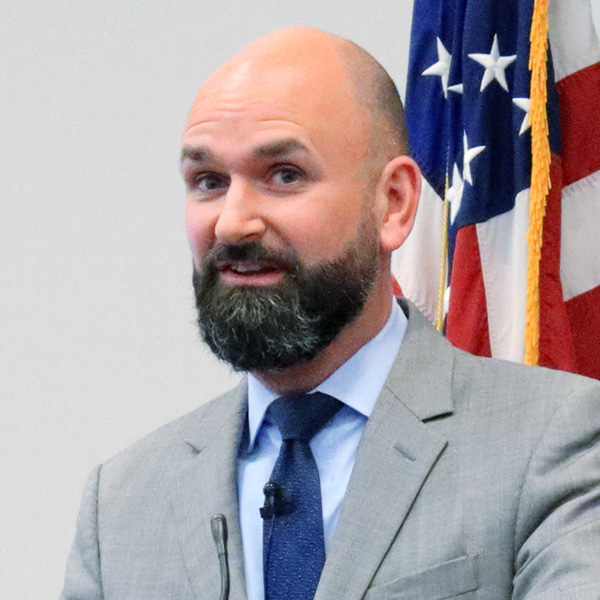SARATOGA SPRINGS, N.Y. — Limited supplies will likely result in higher natural gas prices in New England this winter and could prompt more supportive state policies for the industry, stakeholders told the Independent Power Producers of New York Fall Conference on Sept. 14.
Tight gas supplies could result in rolling blackouts and prices significantly higher than the current national average of more than $8/MMBtu, Northeast Gas Association CEO Charles Crews said during a panel discussion at the conference.
 James Daly, Eversource Energy | © RTO Insider LLC
James Daly, Eversource Energy | © RTO Insider LLC
James Daly, vice president of energy supply for Eversource Energy, predicted 60 to 100% increases in the price of electricity — excluding transmission and distribution costs — partially because of Russia’s cuts in gas supplies to Europe, which have raised LNG prices internationally.
The Russian invasion of Ukraine has compounded New England’s challenges: environmental activism that has blocked new gas pipelines and the century-old Jones Act, which prevents tankers from bringing U.S. LNG to the region.
Natural gas had wide support as a “bridge” fuel to a low-carbon future until the anti-fossil fuel movement began “vociferously” opposing pipeline expansions, Daly said.
“Renewables are being supported heavily by new legislation, but there’s no support at all for natural gas. And there’s opposition to the natural gas, even though the two things could be … complimentary in terms of” decarbonization, he added.
“The war in Ukraine … could be certainly a multiyear [struggle],” he said. “So once customers start to voice their objections to those very high bills, [policies] could change.”
 New England Power Generators Association President Dan Dolan | © RTO Insider LLC
New England Power Generators Association President Dan Dolan | © RTO Insider LLC
Last winter brought higher gas prices and increased volatility largely because of the impacts of the COVID-19 pandemic and the quick economic rebound, said Dan Dolan, president of the New England Power Generators Association. “The story at the time was, ‘It’s going to be okay; this is a one-season issue.’ Then Russia invaded Ukraine, and the world fundamentally changed. And now we are looking at a persistent multiyear situation in which the commodity is constrained, volatility has increased. And in the midst of all that, New England is going through a very similar transformation [to] here in New York, in meeting our climate obligations.”
Coal and oil provided less than 1% of New England’s January megawatt-hours in 2019-2021 but generated 20 to 30% in 2022, Dolan said, and he expects the same in 2023 and beyond. This insulates electric costs from the volatility of gas prices but boosts emissions, he said.
No New Pipelines?
New England is served by five gas pipelines, with most of its supplies coming from the west, through New York. Efforts to expand the infrastructure have been blocked both in New York and New England.
The Massachusetts Supreme Court blocked a proposed gas pipeline that would have been contracted by Eversource and other electric distribution companies because it was inconsistent with the state’s retail restructuring law. “So a change in law would be needed,” Daly said.
Dolan is not optimistic that will happen.
“I do not believe we will ever see another major new natural gas pipeline coming into New England,” he said. “The story now becomes how do we maximize the infrastructure we have? How do we better value those reliability products?”
Dolan said FERC’s gas-electric conference earlier this month left him with some optimism. “It was the first time I’ve heard in years a refocusing around this question of reliability, a recognition that the valuation of that reliability has not received as much attention as it as it needs,” he said. “There was discussion of creating further reserves in the region. There are many different ways in which we can structure that.” (See FERC Comes to Vermont and Leaves with a New England-sized Headache.)
Dispatchability
Gas will likely return to its role as a peaking resource in New England as tougher emissions targets take hold, Dolan said. And it will likely be needed as a dispatchable resource for decades, he added.
“Whether it’s in Massachusetts or Connecticut, or it seems like in New York, there is a recognition we need that level of dispatchability, and reliability overall onto the system. It feels like right now that’s code word for gas, but nobody wants to say it out loud,” he said. (See Clean Energy Groups Don’t Buy ISO-NE’s Gas Reliance.)
He questioned whether hydrogen could provide a solution because New England’s geology is not suited for storage. “I’m hard pressed to see how the vast majority of natural gas fleet that exists in New England doesn’t persist.” he said.
Other Solutions?
Yet New England “does not have a plan beyond two years [for] reliability,” Daly said, a reference to the planned 2024 retirement of Constellation Energy’s Mystic Generating Station and attached LNG import facility in Everett, Mass. (See ISO-NE: Reliability Still Depends on Mass. LNG Import Terminal.)
Daly said Eversource has identified opportunities for “relatively inexpensive” electric transmission upgrades using existing corridors, but their impact will be limited, he said.
Adding more storage for LNG would be very expensive, requiring legislative support for funding, he said.
Dolan questioned whether the elimination of the Jones Act would make a difference for New England because of a trend toward global LNG pricing. “If global markets do settle out, being able to leverage domestic production would be nice,” he said.




